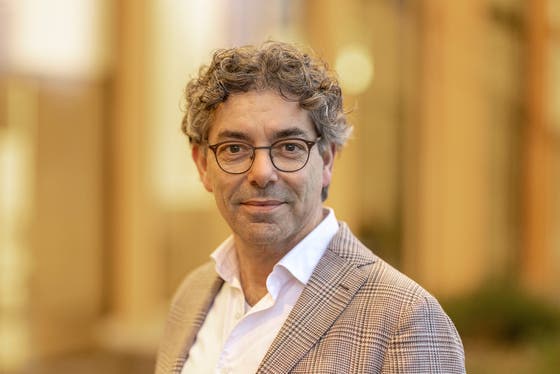'I learned to look at patients specifically'

Hans Merks, professor of paediatric soft tissue and bone sarcomas at UMC Utrecht, delivered his oration on Friday 2 February, titled 'Look and marvel'. A speech about sarcoma research, deeper layers that you only start to see when you realise it and the search for effective treatments for children.
Of the 600 children diagnosed with cancer each year, about 75 (12%) have a sarcoma. Sarcomas are those tumors in the support and musculoskeletal system and of tissues lying between organs. In many cases, this type of cancer is well curable, but when it has metastasised or has a high-risk profile, the prognosis is not good. Hans Merks, research group leader at the Prinses Máxima Centre: 'To treat a sarcoma, we often have to carry out major surgery or radiotherapy at a young age, which dramatically changes, for example, the face, an arm or leg. It is very important to guide children and their parents well in this in various areas; in making the right choice and in aftercare.'
Conscious observation
Hans Merks experienced the importance of learning to observe well during the year he studied art history, halfway through his medical studies. 'There I learned to look much more consciously with an eye for context and what that context can add to what we experience in what we perceive.' Nevertheless, he chose to specialise as a paediatrician, followed by a fellowship in paediatric oncology, where he obtained his PhD on research into tumor predisposition in children at the University of Amsterdam. Still today, Hans Merks benefits from the way in which, during his PhD research on tumor predisposition, he learnt to look systematically at smaller and larger shape anomalies of the human body. These anomalies tell us something about how prenatal development took place.
These are often specific patterns of small signals against a background of systemic abnormalities in, for example, mental development, or the patient's defences. As footballer Johan Cruijff once put it: you only start seeing it when you realise it. 'Clinical genetics has taught me to see bigger connections between seemingly random abnormalities in a patient. I see patterns and can therefore recognise groups of patients who share certain characteristics.'
Meanwhile, Hans Merks has been working in the paediatric oncology research field for many years, specialising in sarcoma treatment and research. He is also chairman of the European paediatric Soft tissue sarcoma Study Group (EpSSG) and vice-chairman of the EuroEwing Consortium (EEC). Since 2015, he has been a Staff Member of the Department of Solid Tumours at the Princess Máxima Centre.
'Imaging biomarkers'
More than half of children with a sarcoma have a soft tissue tumor. These are mainly rabdomyosarcomas, or muscle cell tumors. The remaining children have an osteosarcoma or Ewing sarcoma, which are bone tumors. Sarcomas come in a wide variety, a total of more than 60 different forms are known, each often requiring its own specific treatment appropriate to the stage of disease. An important part of treatment is correctly determining the stage of disease, also known as staging, at diagnosis. In addition, it is crucial to properly monitor the effect of treatment. Together with colleagues at UMC Utrecht and the Prinses Máxima Centre, Merks is therefore focusing on optimising staging and finding so-called 'imaging biomarkers'. 'I expect that thanks to these measurable features on MRI or FDG-PET scans, we can better determine a child's risk profile and the corresponding treatment plan. This is important for every child, but can also help us at the international trial level to see earlier whether a new treatment works or not. With this, we can speed up research.'
To accelerate development of new and personalised treatments, Hans Merks works with the organoid biobank team at the PMC. This team develops sarcoma organoids. These mini-tumors enable research in the lab into the origin and growth of sarcomas and the effect of different drugs. "My goal is to thus accelerate clinical and translational research in the field of sarcomas. Local as well as national and international collaborations are very important in this regard."
